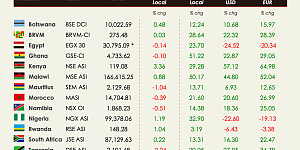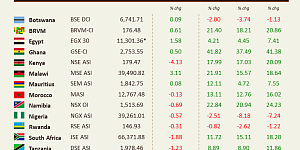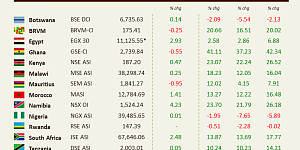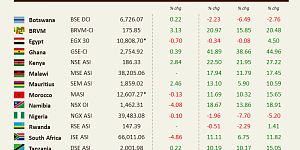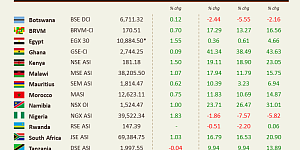Do we need to get used to that level of volatility? That summarises somewhat the feeling this week on global markets. Uncertainties around efforts to stabilize oil prices continued to move the market in both directions like a yo-yo. By the end of the week, oil prices wiped away steep losses on news that Venezuela’s oil minister would meet with fellow oil producers next month. This followed Tuesday’s meeting between President Muhammadu Buhari and the ruler of Saudi Arabia, King Salman Bin Abdulaziz Al Saud, during which they both committed to work towards a stable oil market and a “rebound of oil prices”.
That feeling fed into African markets in a natural fashion. The EGX30 advanced strongly this week, moving above the 6,000 barrier, as it went up 2.27% to close at 6,079.13 points on Arab investors buying activity.
JSE ASI increased by 1.00%. In his budget speech on Wednesday, South-African Finance Minister vowed to bring the fiscal deficit down to 2.4 percent of gross domestic product over the next three years by reducing the civil service and raising taxes. The market reaction did not take time as the rand plunged against the dollar on Wednesday, plunging as much as 3.5 % versus the dollar, while bond yields jumped. The rand was 1 percent lower at 15.7572 against the dollar as of 12:07 p.m. in Johannesburg on Thursday. It seems investors were expecting more significant tax increases and state asset sales to boost revenue. On the positive side, Standard & Poor’s which positioned South Africa on the cusp of junk status in December, said on Thursday they would not downgrade it following the budget speech. They did however say that the budget lacked significant policy announcements that will drive GDP growth, or provide enough business confidence to investors.
NGSE ASI was also weak decreasing 0.83%. The Naira witnessed some gains on dollars overflow, as reserves rose. IMF made a statement insisting on naira devaluation. “The Central Bank of Nigeria needs to devalue the naira by adjusting the official exchange rate of N199/dollar to a more market-determined exchange rate, “the International Monetary Fund has said. This contradicts with the view of President Muhammadu Buhari, who been insisting that Nigeria would not devalue the currency.





